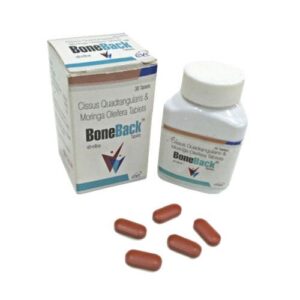CISSUS QUADRANGULARIS (HADJOD) + WITHANIA SOMNIFERA
Cissus Quadrangularis (hadjod): Cissus quadrangularis, commonly known as Hadjod or the bone setter, is a medicinal plant native to India, Southeast Asia, and Africa. It has a long history of traditional use in Ayurvedic and African medicine for its bone-healing properties. The active compounds in Cissus quadrangularis include flavonoids, triterpenoids, and phytosterols.
Use:
Cissus quadrangularis is primarily used for its potential benefit in promoting bone health and aiding the healing of fractures, sprains, and other bone-related injuries. It is also used as a general tonic for promoting overall health and wellness. Additionally, Cissus quadrangularis has been explored for its potential anti-inflammatory, analgesic, and antioxidant effects.
Mechanism of Action:
The exact mechanism of action of Cissus quadrangularis is not fully understood. However, it is believed to work through multiple pathways. It has been suggested that the plant exerts its effects by stimulating osteoblast (bone-forming cell) activity, enhancing collagen synthesis, and promoting calcium deposition in the bones. Cissus quadrangularis may also possess anti-inflammatory properties, which can aid in reducing pain and swelling associated with bone injuries.
Dose:
The optimal dosage of Cissus quadrangularis can vary depending on the specific condition being treated and the product formulation. It is available as a supplement in various forms, including capsules, powders, and extracts. As there is no standardized dosage, it is recommended to follow the instructions provided on the product label or consult with a healthcare professional for appropriate dosing guidance.
Side Effects:
Cissus quadrangularis is generally considered safe when used at recommended doses. However, there is limited research on its long-term safety. Reported side effects are rare but may include gastrointestinal discomfort, such as nausea, stomach upset, and diarrhea. If any allergic reactions or adverse effects occur, it is advised to discontinue use and seek medical attention.
It is important to note that while Cissus quadrangularis may provide potential benefits for bone health and healing, it should not replace proper medical care in the case of severe fractures or injuries. It is always advisable to consult with a healthcare professional before starting any new supplement or treatment.
Withania Somnifera: Withania Somnifera, commonly known as Indian ginseng or Ashwagandha, is an herb used in traditional Ayurvedic medicine. It is native to India, the Middle East, and parts of Africa.
Use: Withania Somnifera is used to promote overall health and wellbeing. It is believed to have various adaptogenic properties, meaning it helps the body adapt to stress and maintain homeostasis. It is also used as a general tonic and to support the immune system. Additionally, Withania Somnifera has been studied for its potential benefits in reducing anxiety, improving cognitive function, and managing reproductive health.
Mechanism of Action: The exact mechanisms of action of Withania Somnifera are not fully understood, but it is believed to exert its effects through various pathways. It may modulate the stress response by reducing cortisol levels, promoting relaxation, and enhancing GABAergic activity. It may also have antioxidant and anti-inflammatory properties.
Dose: The appropriate dose of Withania Somnifera can vary depending on several factors, including the individual’s age, health condition, and the form of the supplement (powder, capsule, extract, etc.). Generally, a common daily dose ranges from 300 to 500 mg of standardized extract, taken 1-2 times per day. However, it is important to follow the recommended dosage instructions provided by the manufacturer or consult with a healthcare professional for personalized advice.
Side Effects: Withania Somnifera is generally considered safe for most people when taken in recommended doses. However, mild side effects can occur, including drowsiness, stomach upset, and diarrhea. It is advisable to start with a lower dose and gradually increase it to assess tolerance and minimize potential side effects. Pregnant women, breastfeeding mothers, and individuals with certain medical conditions should consult with a healthcare professional before using this herb. It may also interact with certain medications, so it is important to discuss potential drug interactions with a healthcare provider.

